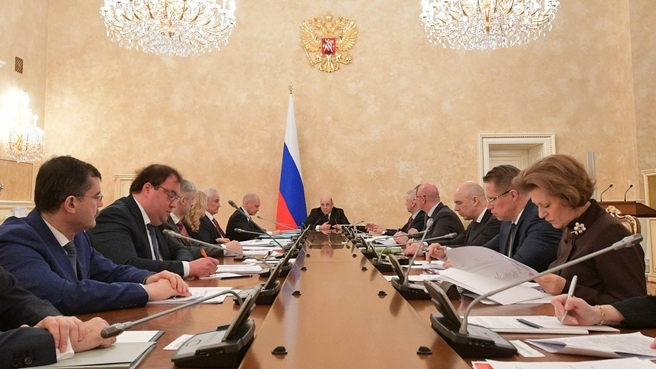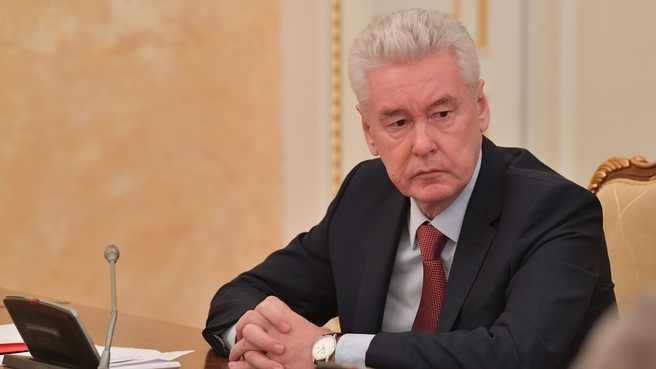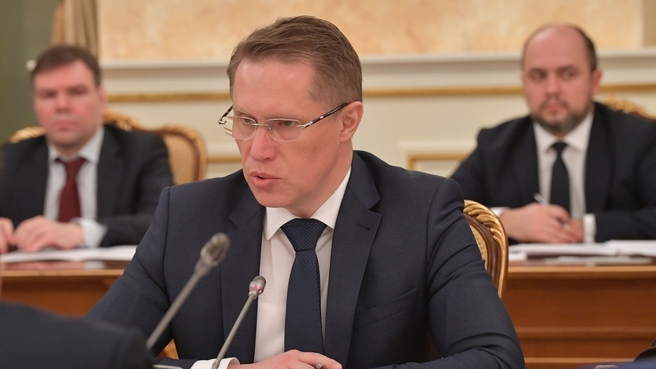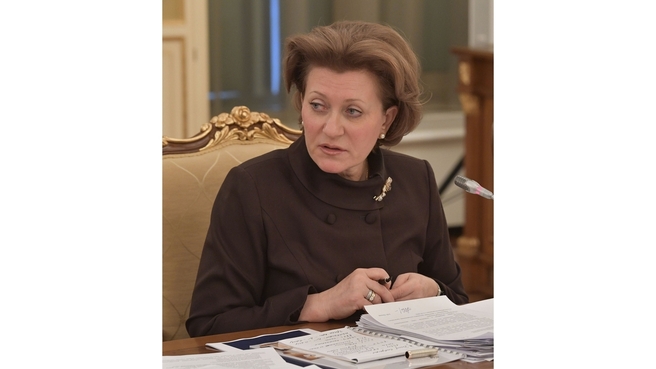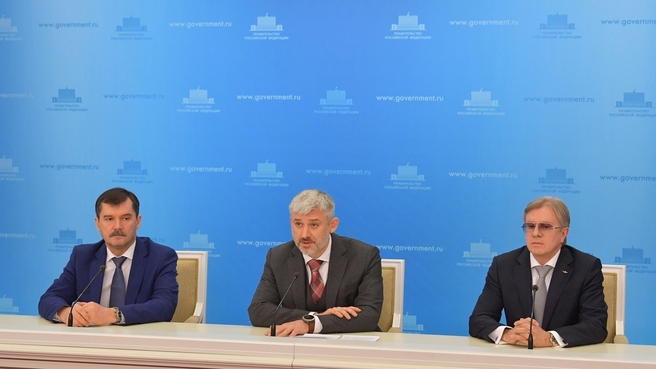The readiness of regional and federal hospitals to admit coronavirus patients, as well as the creation of information systems to monitor self-isolation compliance were discussed.
Mikhail Mishustin’s opening remarks
Statement by Moscow Mayor Sergei Sobyanin
Excerpts from the transcript:
Mikhail Mishustin: Good morning, colleagues. The President and the Government are taking all the necessary measures for people infected by the novel coronavirus and those suspected of having it to be able to receive timely medical help. In this connection, today we will allocate 33.4 billion roubles to 77 regions. The money will be spent to organise additional infection wards and beds in hospitals and equip them in line with the list Sergei Sobyanin mentioned during his teleconferences with heads of the regions.
I have also given a corresponding instruction: to allocate 5.2 billion roubles from the Government Reserve Fund to purchase ambulances. Soon this money will provide about 1,200 vehicles to the regions. In addition to this, the Health Ministry must quickly choose federal medical institutions where infection beds will be added to provide aid to patients with the coronavirus. Everything must be prepared: beds, equipment and medical personnel.
We will also take all measures to decrease the infection rate. As you are aware, colleagues, Moscow is now on high-alert due to the threat of the coronavirus. I have already spoken about this at the meeting with deputy prime ministers. The executive orders of the Moscow Mayor and the Moscow Region Governor introduce new, additional security measures. We have recently discussed them at our meeting with Sergei Sobyanin. Please, Mr Sobyanin, elaborate on them and report on the developments in the capital as well as the regions.
I am also asking you to discuss the introduction of similar measures in the Russian regions via teleconferences with the heads of the regions and report on the results. I am confident that these steps will have a positive effect locally.
Today, at the meeting of the Coordination Council Presidium, we also have our colleagues from the transport industry: Minister of Transport Yevgeny Ditrikh, Head of the Federal Agency for Air Transport Alexander Neradko and Aeroflot CEO Vitaly Savelyev. They will report on how we will return Russian nationals home from abroad and send away those who for some reasons are staying in our country and want to leave it (including foreigners) in the situation of temporary restrictions on crossing the state borders of the Russian Federation. In addition to this, Rospotrebnadzor Head Anna Popova will describe in detail how the isolation of those who returned to Russia from abroad will be oranised, as well as other quarantine measures.
And, of course, once again the most important thing. Today Health Minister Mikhail Murashko and Head of the Federal Medical-Biological Agency Veronika Skvortsova will report on hospitals’ readiness to accept patients with the coronavirus. Strict control measures concerning the counter-pandemic regime are a crucial matter.
Please, Mr Sobyanin, you have the floor.
Sergei Sobyanin: Mr Mishustin, colleagues.
I wanted to thank you for the measures taken at the federal level. These include the stay-at-home week, which gave us the opportunity to dramatically step-up people’s self-isolation measures. We can see that in the Russian regions and in Moscow, passenger volumes in the metro, public transport and commuter trains have decreased considerably. Nevertheless, even in Moscow about 20 percent of people are reluctantly responding to these measures, so after consulting with you and the national leaders we undertook additional steps to impose the stay-at-home regime and self-isolation not just on the risk group (senior citizens, and those recently returned from abroad), but everybody who is not working in production or government agencies or medical institutions. This places great responsibility on the people.
With the development of information systems we will control this situation more strictly with each passing day. Hopefully, by the end of the week we will have information systems that will enable us to control almost completely people’s movements and prevent any violations that might occur. We are also expecting a federal law, which would give us the opportunity to work on this issue even more effectively.
After we all adopted the core measures to contain the infection, now our primary task is testing. This is why we are expecting the new test-systems developed by various Health Ministry institutions, the Federal Medical-Biological Agency and others to arrive at our laboratories, federal and even private laboratories this week. This is very important.
The second task – you mentioned it – is the deployment of a network of hospital beds and the mobilisation of the public health service to fight the coronavirus. This includes both regional and federal institutions. Moreover, I would ask you to give us the instruction so we can work on the issue of private healthcare facilities, which can also provide such assistance.
Mikhail Mishustin: Thank you.
Mikhail Murashko, please take the floor.
Mikhail Murashko: Mr Prime Minister, colleagues.
Currently, the Ministry of Health is monitoring and coordinating all aspects of medical assistance for patients, including consultations with federal specialists.
In the Russian Federation, there are over 1,500 patients, including 32 in serious condition in 18 regions. They require special, close attention.
If we look at the situation not only in terms of the coronavirus infection, but also in terms of overall mortality rates, we can see that in the 13 weeks of 2020 these indicators are lower than last year, including the fatality rates from community-acquired pneumonia with a different etiology. Compared to 2019, the mortality rate is almost 9 percent lower. We monitor community-acquired pneumonia daily, and I want to note that a plan with virtually the same controls and accompaniment as for specific pneumonia has been introduced for community-acquired pneumonia with a different etiology.
The Ministry of Health has ordered the establishment of a new procedure, including an additional one, for patient observation – something we discussed at our previous meeting. This is fully underway, and agreed to by the Ministry of Justice on Friday; it was approved and entered into force on Monday.
The information resource, which includes treatment regimens, the patient management protocols directly, has been updated, and since Friday, the fourth version of methodological recommendations, including the latest therapy and diagnostics, have been in effect.
We have developed another information resource. We are ready to put into operation a new information system for monitoring patients who are at any severity in the disease (mild, moderate or severe), after the Government signs the resolution. Twenty-four regions have already tested this system, it is working, and we will fully integrate it with the Communications Ministry.
And, regarding additional beds at hospitals. The total number of beds to be provided is actually increasing to almost 100,000. So far, 78,000 beds have already been prepared. We have developed an action plan, and this morning we once again conducted the reorientation and training of personnel and senior staff at medical institutions. We see that a number of medical institutions require organisational measures, including the transfer of additional equipment, which is being released due to a reduction in planned surgeries that can be postponed.
As for federal institutions. We sent a letter to the Moscow government on the re-purposing of federal hospital beds. By the end of the week, we will have fully prepared at least two more hospitals that will treat this category of patients. We fully provide these hospitals with personnel and medicines.
We also decided to recruit medical workers (the relevant documents were signed today), who are completing their education at medical universities and colleges, including resident doctors and postgrads. We can mobilise an additional 40,000 healthcare workers for the network.
As for laboratory testing. Mr Sobyanin mentioned this extremely important issue. Roszdravnadzor issued a permit to seven domestic companies for the production of test kits, including those for high-throughput testing. In fact, submissions are considered within one or two days. Since Friday, the manufacturers have already begun producing additional test kits, after a reduced pre-analytical phase timeframe. Today, the Government’s actions in regulatory practice are allowing us to gain time. In particular, the domestic manufacturer today receives additional permits to produce test tubes for testing with transport media for the collection of biomaterials.
Mikhail Mishustin: Thank you. Ms Skvortsova, take the floor, please.
Veronika Skvortsova: Mr Mishustin, colleagues.
There are 1,038 stationary beds in total for the infection at the Federal Medical-Biological Agency’s medical institutions, but we have prepared another 2,595 in separate buildings, in compliance with the requirements of the sanitary and epidemiological situation. This means the Agency’s institutions will have 3,633 beds, including 600 intensive care beds, with 506 of them having ventilators. We are prepared to add intensive care beds, beds with oxygen: we have 1,339 such beds.
Starting today, three centres in Moscow are only receiving patients with the coronavirus: the Burnazyan Federal Medical Biophysical Centre, the Federal Scientific-Clinical Centre of Otorhinolaryngology at the Federal Medical-Biological Agency that was completely re-purposed, and the 85th medical unit. There is also an additional Federal Medical-Biological Agency’s centre in the Moscow Region based at the Federal Clinical Centre of High Medical Technologies. The total number of additional beds in Moscow and the Moscow Region is 797, including 135 intensive care beds. We are waiting for the additional supply of ventilators and extracorporeal membrane oxygenation equipment based on the request we sent.
Mikhail Mishustin: Thank you. Please, Ms Popova.
Anna Popova: Mr Mishustin, meeting participants.
About the epidemiological situation. There are 1,534 novel coronavirus cases in 65 regions of the Russian Federation. The area is expanding. I want to note that more than 25 percent are family, passenger transport and work contacts. Nearly 1,100 are people who came from other countries and brought the infection in, and then they infected their colleagues and family members.
Of this total, 63 percent had acute respiratory viral infection, 14 percent were diagnosed with pneumonia, and 22 percent did not have any infection symptoms.
Rospotrebnadzor is monitoring the health status of 19,359 contacts; 5,753 contacts were eliminated from the control as not showing any infectious disease.
The level of pneumonia in the country is not exceeding the long-term average. The surge that we observed last week has levelled off this week. Similarly, the level of acute respiratory viral infection and influenza is not exceeding the overall average and is decreasing as is typical of the seasonal trend. The monitoring of this is complete, and we are sure about these figures, that there is no mimicry under the novel coronavirus infection.
As per your instruction, Rospotrebnadzor prepared an order on the acquisition and distribution of test kits produced at Russian budgetary institutions in order to supply them, as Mr Sobyanin mentioned, to the laboratories that are conducting testing.
I think it is very important today to pay attention to the fact that the number of people arriving in the Russian Federation from countries with an unfavourable epidemiological situation is not slowing. Today, together with the internal affairs agencies, we are monitoring about 737,000 Russians who are self-isolating, but ensuring this self-isolation is a significant problem. But at the same time, together with the Ministry of the Interior, we have managed to monitor about 82 percent of those who have entered the country in the first two days (they are reporting to the authorities); and for the other 20 percent, this is the time needed to cross the territory of the Russian Federation until reaching their final destination.
Together with the Ministry of the Interior, we have managed to take control of almost everyone within three days, but I am sure that the system that has been proposed today, and which we will discuss later today, will have a more serious effect in a shorter period. I really want to thank you for the fact that this system was created so quickly. The proposal was just initiated, but we already have the result.
<…>
